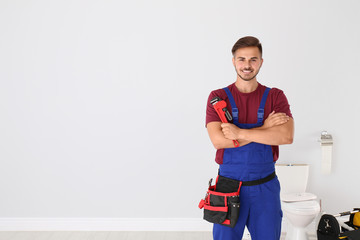Provo Plumber installs, repairs and maintains the pipes and fixtures that facilitate water supply, drainage, and sewage in homes and businesses. They also read blueprints and building codes to plan plumbing projects and ensure they meet local regulations.
Unlike some professions that require years of schooling and student debt, becoming a plumber takes just a few months of vocational training and an apprenticeship. Learn how to get started in this rewarding career.
A plumber performs a variety of tasks, including installing, connecting, and repairing pipes and fixtures. They also interpret blueprints and building codes to ensure plumbing systems are integrated seamlessly into construction projects. They may work in residential, commercial, or industrial settings. Some plumbers specialize in specific types of plumbing, such as water heater installation. Others work in specific environments, such as hospitals or power plants. Plumbers must have excellent critical thinking skills to assess problems, weigh options, and make decisions quickly. They must also be able to verbally communicate effectively with customers and other team members.
Plumbers assemble and install plumbing fixtures, such as sinks, commodes, bathtubs, showers, and appliances. They connect these fixtures using hand and power tools, such as screwdrivers, pliers, wrenches, hammers, acetylene torches, soldering and welding equipment, and pipe cutters and threaders. They may also use specialized tools to repair damaged or clogged plumbing fixtures. Plumbers inspect and test pipe systems to determine if the systems are functioning properly. They also troubleshoot problems, such as leaks and clogs, by listening to the customer’s concerns and investigating the issue with a visual inspection.
In addition to these core job duties, plumbers must also keep up with a variety of administrative tasks such as ordering and maintaining materials, cleaning up shop / worksites, and keeping track of company vehicles and inventory. This position requires a valid driver’s license and reliable transportation to get to work sites on time. Other qualifications include the ability to read and interpret blue prints and the ability to work independently or as part of a team. Plumbers must be willing to work overtime when necessary and be able to respond quickly to emergency calls. They must also be able to communicate clearly with customers, other team members, and supervisors. The job outlook for plumbers is very positive, with employment expected to grow faster than the national average for all occupations. This is due to aging infrastructure and the increasing need for plumbers to repair and maintain existing plumbing. There are many opportunities for career advancement and promotion within the plumbing industry as well.
Education and Training Requirements
Plumbing is a skilled trade that requires specialized training. Plumbers need to be able to read blueprints and understand how to install, assemble, and test plumbing systems. They must also be able to fix problems quickly and efficiently. Plumbers need to have excellent communication skills and be able to work with a team. They also need to be familiar with a variety of tools and equipment. Many plumbers complete a vocational school program or an apprenticeship. These programs typically last two to five years and include both classroom learning and on-the-job training. Plumbers must also get a license to practice their profession. This process varies by state, but most require an apprentice license, followed by a journeyman license. Plumbers can then advance to a master plumber license.
In addition to education and training, plumbers must be able to pass a background check and drug screening. This is especially important for plumbers who work on public projects. They may also need to be certified to install certain types of plumbing systems, such as medical gas piping or process piping. Continuing education courses are available through trade schools and professional associations to help plumbers stay up-to-date on new technologies, practices, and safety regulations.
Being a plumber can be a rewarding career. It offers good pay, job security, and plenty of opportunities for advancement. It is also a good option for people who want to avoid working in more stressful occupations, such as nursing or teaching. However, it is important to consider the fact that being a plumber often involves working on emergency situations, which can disrupt personal lives.
To be a successful plumber, you will need to have a high school diploma or a GED certificate. You will also need to complete a supervised plumbing apprenticeship or attend a vocational school to learn the basics of plumbing. After completing your apprenticeship, you will need to pass an exam and earn a license. Many states have reciprocal agreements that allow licensed plumbers to work in other states. Licensing requirements vary by state, so it is best to research the specific requirements in your area before you start the apprenticeship process.
Work Environment
Plumbing is a hands-on career that involves a good deal of physical labor. Plumbers often work in cramped spaces, and they are frequently exposed to fumes, dust, temperature extremes and noise. The job can also be dangerous, as plumbers sometimes work with flammable and hazardous materials.
Plumbers may work for private individuals, construction companies, or public works departments. They may also choose to work as independent contractors or start their own plumbing businesses. Independent plumbers typically have greater flexibility in their work schedules and the ability to set their own rates. However, they must still meet the same professional standards as other plumbers.
Most plumbers enter the profession through an apprenticeship program, which usually lasts four years and combines on-the-job training with classroom instruction. After completing an apprenticeship, plumbers must pass a state exam to become licensed professionals. Some states also require continuing education for license renewals.
Some plumbers specialize in residential or commercial work. Residential plumbers typically work in homes and apartments, fixing water and sewage systems as well as fixtures like toilets and sinks. Commercial plumbers usually work on larger systems in office buildings, hotels and restaurants.
A career as a plumber can be exciting and rewarding. The job requires a unique blend of technical knowledge and creative problem-solving skills. Plumbing is an ideal career for those who enjoy working with their hands and have a strong desire to learn.
Some plumbers may be promoted to supervisory roles. These positions involve overseeing the day-to-day work of plumbing staff members and ensuring that all work is performed according to quality and safety protocols. Plumbers who have been in the profession for several years and demonstrate their abilities may be able to earn this position.
Salary
There are many reasons to choose a career as a plumber. Not only are the hours flexible, but you can earn a good salary and build your wealth quickly. Moreover, plumbing is considered to be recession-proof, as it always has been in demand because water and sewage systems are essential for all homes and businesses.
The best part is that you don’t need to go to college for years to become a plumber. You can start by taking an apprenticeship and making around $12 an hour, which will slowly increase over time as you learn the trade. Once you’re a journeyman plumber, you can expect to make about $60,000 a year. Then, if you want to make even more money, you can work for yourself and set your own rates.
You can also earn higher wages by working for a large corporation or in the construction industry. Depending on your skill level and geographic location, you can even make six-figures as a plumber.
Another big advantage of being a plumber is that you can build your wealth much faster than if you became a doctor or any other professional with a high degree. The reason for this is that it takes a lot of time and money to go to college, take all the science and math classes, and then graduate from medical school.
Besides, plumbers can often charge less than doctors for their services. This is because plumbers don’t have the same lifestyle expenses that doctors do, such as the cost of a house and a car, or paying for all those expensive prescription drugs. Furthermore, plumbers typically pay less for insurance and other overhead costs than doctors.


